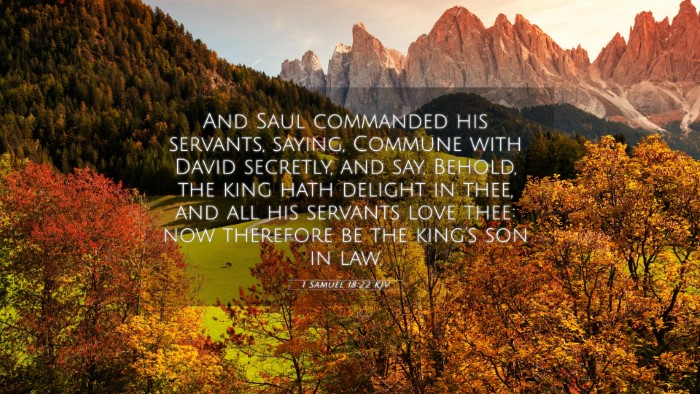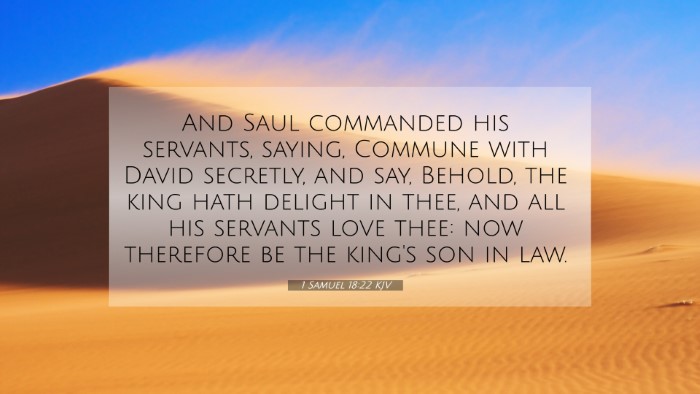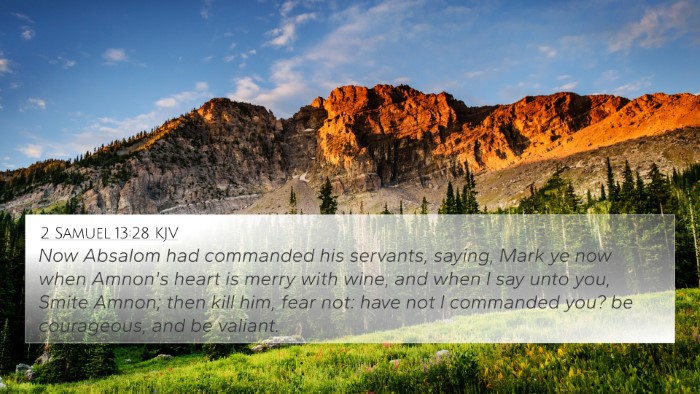Understanding 1 Samuel 18:22
Bible Verse: 1 Samuel 18:22 - "And Saul commanded his servants, saying, 'Commune with David secretly, and say, Behold, the king hath delight in thee, and all his servants love thee: now therefore be the king's son-in-law.'"
Overview
This verse occurs in a pivotal moment in the life of David and King Saul, illustrating the burgeoning tension and jealousy that would define Saul's relationship with David. As detailed in various public domain commentaries, this passage emphasizes themes of ambition, loyalty, and the complexities of human relationships in the context of God's chosen leader.
Commentary Insights
-
Matthew Henry:
Matthew Henry reflects on the motives behind Saul's invitation to David to marry his daughter. Henry suggests that Saul's actions stem from a mix of political strategy and personal insecurity, indicating that Saul desires to keep his enemies closer while simultaneously attempting to protect his throne.
-
Albert Barnes:
Albert Barnes discusses the implications of Saul's command to his servants, noting the underlying deceit in Saul's overtures of friendship. He points out that this was a calculated move by Saul, showcasing an attempt to curry favor with David while masking his growing fear and jealousy.
-
Adam Clarke:
Adam Clarke provides a historical context to this narrative, indicating the cultural significance of marriage alliances in ancient Israel. He emphasizes that Saul's request was fraught with subtext, representing both desperation and a strategic manipulation of familial bonds to secure David's loyalty.
Thematic Connections
This verse can be connected to several other biblical passages that explore themes of leadership, jealousy, and divine selection:
- 1 Samuel 16:1-13 - The anointing of David as king.
- 1 Samuel 18:1-4 - The bond between David and Jonathan.
- 1 Samuel 19:1-7 - Saul's attempts to kill David.
- 1 Samuel 24:1-22 - David spares Saul's life in the cave.
- Psalm 59:1-2 - A psalm reflecting David’s prayers during Saul's pursuit.
- Matthew 10:36 - "A man’s enemies will be those of his own household," which resonates with David's experience.
- John 15:18-20 - The theme of enmity between leaders and followers.
Cross-Referencing and Related Themes
The analysis of this verse highlights the significance of cross-referencing Biblical texts to deepen understanding. Key themes in this passage can also be seen in:
- Thematic Bible verse connections: Explores loyalty versus betrayal.
- Comparative Bible verse analysis: Juxtaposing David's ascent with Saul's decline.
- Scriptural cross-referencing: Insights into divine providence amidst human conflict.
Practical Applications
This verse serves as a reminder of the complexities involved in leadership and relationships. For contemporary readers, it prompts reflection on the nature of ambitions and the ethical considerations that accompany power dynamics.
Conclusion
1 Samuel 18:22 is a potent reminder of the intersection between divine purpose and human actions. Through careful study and cross-referencing Biblical texts, readers can gain deeper insights into the narratives that shape understanding of faith, power, and loyalty in the biblical context.






